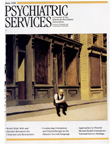Quality of care and use of less restrictive alternatives in the psychiatric emergency service
Abstract
OBJECTIVE: The study examined factors affecting clinicians' decisions in the psychiatric emergency service about referring patients to less restrictive alternatives to inpatient care. Indicators of quality of care and the severity of the patient's condition were a particular focus. METHODS: Trained mental health professionals observed the evaluations of 425 patients in seven California county general hospitals. Multivariate modeling was used to examine variables thought to predict disposition to alternative care. RESULTS: Less restrictive alternatives were available for 61 percent of the 425 patients and were used for 39 percent; they were overlooked by clinicians in 14 percent of cases and considered but not used in 8 percent. Patients' need for a controlled hospital setting, as indicated by the severity of their condition, was most important in determining use of hospital alternatives. Quality of care, especially the clinician's ability to engage patients in treatment at a level appropriate to their functioning, was also a significant predictor of whether alternative care was considered or used. CONCLUSIONS: Under managed care, clinicians are under extreme economic pressure to use less restrictive alternatives, thereby reducing costly inpatient care. To ensure quality of care in general hospital emergency services, the development of supervised hospital alternatives is crucial. Clinicians should be encouraged to engage patients in treatment if appropriate use of alternative care is a goal.
Access content
To read the fulltext, please use one of the options below to sign in or purchase access.- Personal login
- Institutional Login
- Sign in via OpenAthens
- Register for access
-
Please login/register if you wish to pair your device and check access availability.
Not a subscriber?
PsychiatryOnline subscription options offer access to the DSM-5 library, books, journals, CME, and patient resources. This all-in-one virtual library provides psychiatrists and mental health professionals with key resources for diagnosis, treatment, research, and professional development.
Need more help? PsychiatryOnline Customer Service may be reached by emailing [email protected] or by calling 800-368-5777 (in the U.S.) or 703-907-7322 (outside the U.S.).



